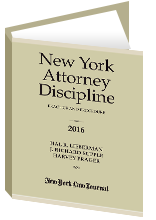Giuliani, Temporary Suspension, Due Process, and “Political Speech”
Lest anyone think the temporary suspension of former Mayor Rudy Giuliani was a violation of his constitutional rights to due process or free speech, the facts and law are to the contrary. Since the 1986 landmark New York Court of Appeals case, Matter of Padilla,1 later codified in the New York Rules for Attorney Disciplinary … Read more

